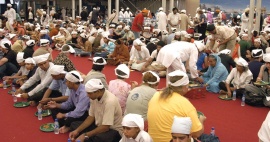Template:AOW11: Difference between revisions
Hari singh (talk | contribs) No edit summary |
Hari singh (talk | contribs) No edit summary |
||
| (10 intermediate revisions by the same user not shown) | |||
| Line 1: | Line 1: | ||
{{aowh|[[Langar]]}} | |||
[[Image:MDSC 0095m.jpg|270px|right|Langar service in progress at Spain Forum 2004]] | [[Image:MDSC 0095m.jpg|270px|right|Langar service in progress at Spain Forum 2004]] | ||
'''[[Langar]]''' or '''free kitchen''' was started by the first Sikh Guru, [[Guru Nanak Dev]] Ji. It is designed to uphold the principle of '''equality between all people''' of the world regardless of '''religion, caste, colour, creed, age, gender or social status'''. | |||
In addition to the ideals of equality, the tradition of [[Langar]] expresses the ethics of '''sharing, community, inclusiveness and oneness''' of all humankind. "..the Light of God is in all hearts." (sggs 282). | |||
For the first time in history, Guruji designed an institution in which all people would sit on the floor together, as equals, to eat the same simple food. It is here that all people high or low, rich or poor, male or female, all sit in the same pangat (literally "row" or "line") to share and enjoy the food together. | |||
[[ | The institution of [[Guru ka Langar]] has served the community in many ways. It has ensured the participation of women and children in a task of service for mankind. Women play an important role in the preparation of meals, and the children help in serving food to the [[pangat]]. [[Langar]] also teaches the etiquette of sitting and eating in a community situation, which has played a great part in upholding the virtue of sameness of all human beings; providing a welcome, secure and protected sanctuary. {{aowf|Langar}} | ||
Latest revision as of 22:39, 15 March 2011
Langar or free kitchen was started by the first Sikh Guru, Guru Nanak Dev Ji. It is designed to uphold the principle of equality between all people of the world regardless of religion, caste, colour, creed, age, gender or social status.
In addition to the ideals of equality, the tradition of Langar expresses the ethics of sharing, community, inclusiveness and oneness of all humankind. "..the Light of God is in all hearts." (sggs 282).
For the first time in history, Guruji designed an institution in which all people would sit on the floor together, as equals, to eat the same simple food. It is here that all people high or low, rich or poor, male or female, all sit in the same pangat (literally "row" or "line") to share and enjoy the food together.
The institution of Guru ka Langar has served the community in many ways. It has ensured the participation of women and children in a task of service for mankind. Women play an important role in the preparation of meals, and the children help in serving food to the pangat. Langar also teaches the etiquette of sitting and eating in a community situation, which has played a great part in upholding the virtue of sameness of all human beings; providing a welcome, secure and protected sanctuary. .....More

